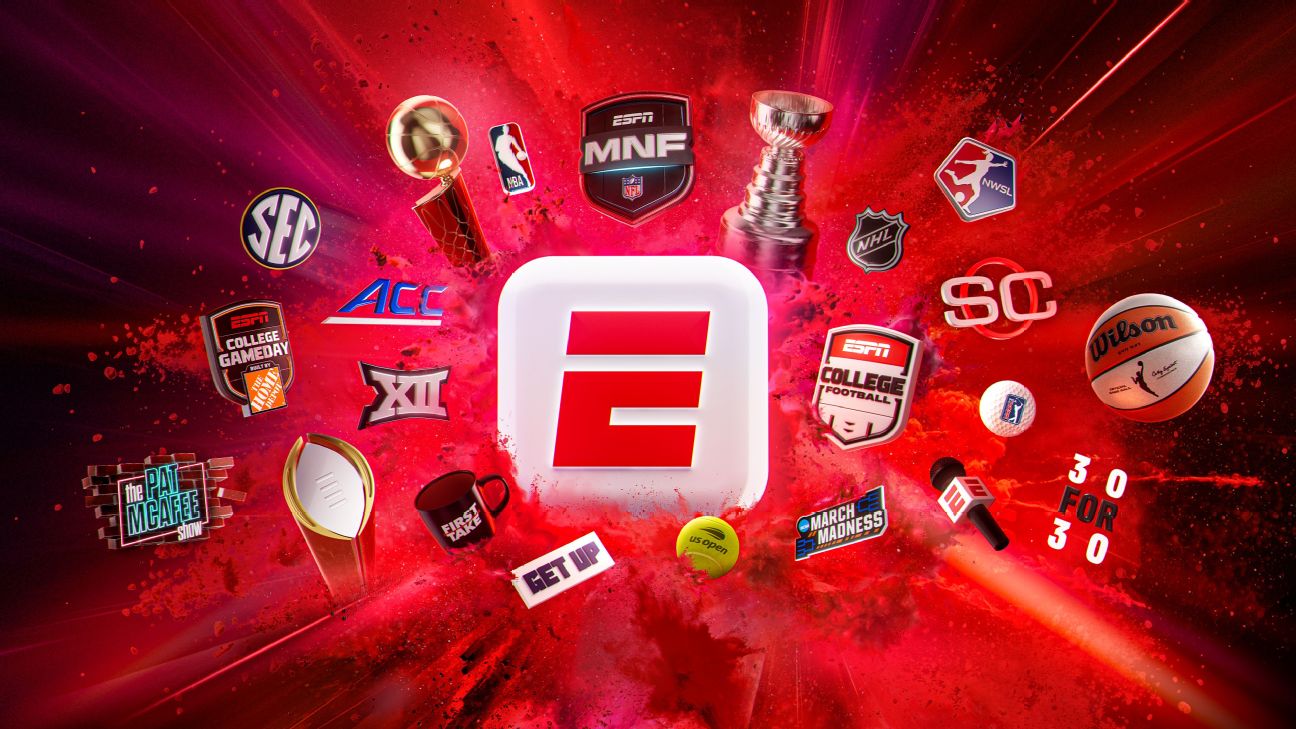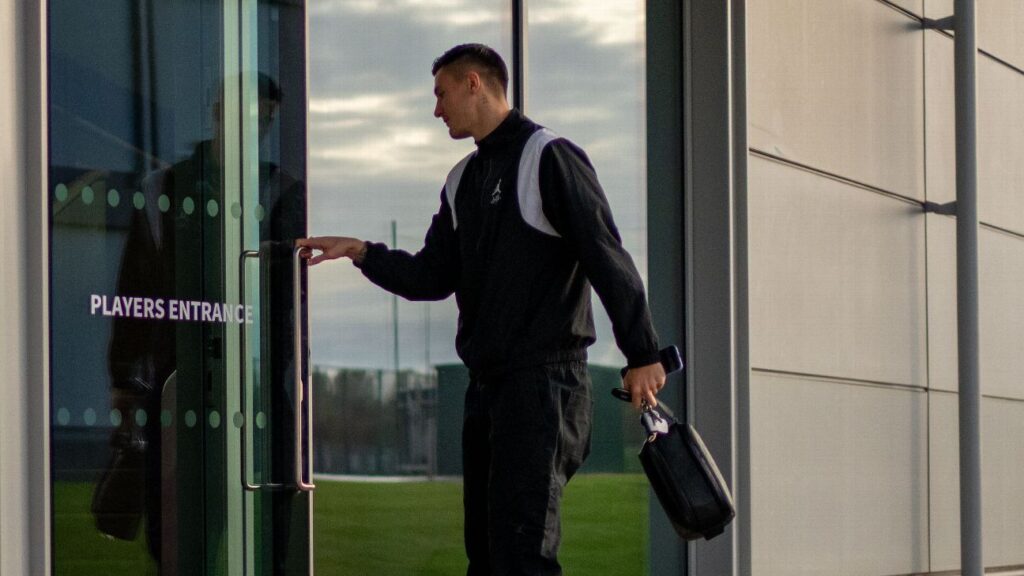Each day, Manchester United’s players drive down Birch Road, occasionally stopping for the horses from the Carrington Riding Centre or a cyclist, and turn into the club’s training ground. When the autograph seekers are satisfied and the entry barriers are lifted, they turn in front of the red neon “Manchester United” sign and head toward the first team parking lot behind the main building.
With their sports cars and luxury SUVs locked and their travel bags under their arms, they walk inside.
Once in the area known as the “players’ corridor,” an office behind glass panels is immediately on the left side, with a large desk in the middle and chairs on either side. On the back wall is a large flat-screen TV, and there are telephones and laptops in the room. The door is always open.
But it’s not an office for manager Ruben Amorim, CEO Omar Berrada or director of football Jason Wilcox. Instead, this room is reserved for the player care team. It’s the department that works to ensure each squad member has everything they need off the pitch so they can perform on it.
Player care departments aren’t unique to United. Across the Premier League, clubs are investing more to make sure their players have everything they need to perform at their optimum level. At United’s training ground, these services are front and centre for a reason.
The goal? Players leaving their problems at the door, feeling better and heading into training with a clear mind, ready to focus on football.
What is player care?
If the manager’s job is to oversee what happens at the training ground, it’s the responsibility of the player care department to look after the rest. Anything and everything a player might encounter can land on their desk, most of it not football-related.
“It’s based around the person rather than the player,” player care expert Hugo Scheckter told ESPN. “A very vague way of putting it is that it’s everything that affects a player that’s not football or medical. For three or four hours a day, players are at the training ground. Everything outside of that can be covered by player care.
“It could be personal-developmental stuff, giving them the life skills to improve themselves, welfare stuff like signposting to mental health provisions, or operational things like relocations and problem-solving. We’re trying to be that resource where they can remove the stress away from life to focus on football.”
– Ian Darke’s PL stars so far: Haaland, Caicedo, more
– If the World Cup started today, who will win it?
– Connelly: Lessons learned after 10 games in top leagues
Scheckter has worked for Premier League clubs, including West Ham and Brentford, and in 2020, he set up the Player Care Group. He has years of experience helping players find houses, pick schools for their children, tax cars and sort match tickets.
Other times, it means dealing with emergencies such as a car accident or home break-in. Occasionally, the problem is more unusual.
“I had one player who asked me to hunt a bird that was scaring his girlfriend. He wanted it shot, and I had to say, ‘We don’t do that in England,'” Scheckter said.
“My solution was to get an ultrasonic bird that basically scared it away, but his first thought was can we [kill it]? Ultimately, they wanted a problem solved, and I can understand that. The bird was tapping on the window all the time, and his girlfriend was scared of birds. So we got a little £10 thing on Amazon to scare it away.
“It can seem a small thing, but then on the other hand, if he’s awake all night or always getting complaints from his girlfriend, it can affect performance. It sounds silly, but it can be quite important as well.”
‘The canaries in the coal mine’
In the search for marginal gains and a competitive edge, clubs are increasingly taking player care more seriously. Foster and Partners, the London-based architectural firm responsible for the £50m revamp of Manchester United’s Carrington training ground, purposely put the player care office toward the front of the players’ entrance to the building.
It’s a similar story at clubs all over the world.
“The player care team are like the canaries in the coal mine,” one high-level source at a Premier League club told ESPN. “Often, they’re the ones who can spot the first sign of trouble.
“Coaches and medical staff will know everything about a player’s performance, but the player care or player support team know far more about their non-football lives than a manager or coach. And the two things are intertwined. One impacts the other.”
Scheckter adds: “I think it used to be a very reactive service where a player would bring a problem in, and they would try and solve it. Now, I think you’re seeing more and more clubs who are trying to get ahead of those problems, so they don’t even appear at all. Or if they do, that they’re well-managed, and there’s a process in place.”
All of ESPN. All in one place.

Watch your favorite events in the newly enhanced ESPN App. Learn more about what plan is right for you. Sign Up Now
Investment in player care varies from club to club. Player care teams can range from one or two employees to five or more. Most Premier League clubs have separate departments for their men’s, women’s and academy sides.
Most of the time, however, the department’s effectiveness depends on how seriously it’s taken by the first-team manager and his staff. Some coaches can be quite dismissive of anything that goes on outside the training ground, but others are keen to take a more holistic approach.
“A lot of time, it’s club culture-dependent,” Scheckter said. “I’ve had managers who are not negative towards it, but kind of apathetic. It depends from manager to manager. With some, you just stay out of the way, and with others, you’re really involved at the top table in management meetings every day. That’s really exciting as well.”
There are clear benefits to including the player care team in performance meetings that include other key heads of department.
“You’ve got the nutritionist there, you’ve got the fitness coaches there, you’ve got the coaching staff there, the manager there. And the conversation can be about a player who has lost three kilos in the last month,” Scheckter said.
“I can be like, ‘Oh well, that’s because his girlfriend is away and he doesn’t cook.’ So next time his girlfriend goes away, we need to make sure he’s getting food delivered or we get a chef in, or whatever it is. The nutritionist in isolation might be thinking he’s unwell or he’s skipping meals. It’s good to have that joined-up approach.
“I’ve gone to managers before and said privately, ‘Look, his mother died a year ago on this day, just so you are aware,’ and they’ll go, ‘OK, thank you. That’s why he was off today in training.'”
With football becoming an increasingly global game, there’s pressure on player care teams to help players new to the country settle quickly. It’s not unusual for departments to be in touch with counterparts at rival clubs, especially if they have players of the same nationality.
“If we’ve got a player from Brazil, we might get in touch with another club local to us if they also have a Brazilian player,” one Premier League source said. “It’s in our interest to do that, share intelligence, and help build a wider network for a player’s family to help them feel settled.”
1:12
Are Manchester United getting smarter with their transfer deals?
Mark Ogden explains why there’s optimism around Manchester United’s transfer strategy after turning down the chance to sign Chelsea’s Roméo Lavia.
In many circumstances, the role of the player care team extends beyond the players.
“The partners, especially at the Premier League level, none of them tend to work or very few of them tend to work, and so you have a situation where they’ve just sat around and so trying to provide a purpose for them and a direction for them is really important,” Scheckter said.
“We see it more and more where the player is really happy, but the partner or the family aren’t, and so we’re seeing clubs invest more and more into family programs.
“It can be hard moving to a new country. We’re definitely seeing that as a bigger issue, where players are happy, partners are not, and then that’s leading to a player either wanting to leave or talking about potentially having to leave, which is a disaster for clubs.”
Whether it’s to take on the role of wellness professional or concierge, the job of the player care team is to keep players happy. But that doesn’t mean clubs want to pamper their stars.
“There’s a balance,” one source told ESPN. “We don’t want players who are detached from everyday life. But we also don’t want players worrying about renewing a passport or a dispute with a landlord because that takes up mental space.
“There’s a growing understanding throughout sport that mental well-being is important to performance. We want to take away the burden of the stresses associated with everyday life as much as we can so players can focus on training and matches.”
‘Make sure the athletes are the best they can be’
More often than not, the player care team members work in the background. On other occasions, they’re thrust into the spotlight.
After West Ham failed to win for more than two months, new manager Nuno Espirito Santo revealed that the club’s player care department sourced baby pictures of the players to decorate the dressing room to serve as motivation ahead of Newcastle’s visit to the London Stadium. It worked, and West Ham won 3-1.
“It was a surprise for everybody,” Nuno said afterward. “The player care [team] really do things really nice. They did it in a really nice way, the player care. The players didn’t know.
“It’s nice to see when we are young and had dreams. For us, it is important to go back to that feeling of being young and happy and try to enjoy things.”
Scheckter tells a story about a player he encountered at the start of his career in player care who appeared to be fine on the surface but left at the end of the season because his partner hadn’t settled.
There also have been small wins that can make all the difference.
“There was a player who was consistently late for team meetings and he was an African player, and he got dropped from a game,” Scheckter said. “The manager was basically like, ‘He’s just not professional, he’s not focused.’ So, I went and spoke to him, and he was very upset about it.
“I said to him, ‘Why are you late? He said, ‘Well, where I’m from … we don’t have reliable transport, we don’t have reliable timekeeping devices, and meeting time in my culture and my life has always been a suggestion.’ And I’m like, ‘Well, OK, I appreciate that, but in the UK or in England, if you’re not five minutes early, you’re late.
“And so I said, ‘OK, let’s work with you.’ I would go and knock on his door or go get him before everything he had to be at for a couple of weeks, and after those couple of weeks, then he kind of got it and was on time. It’s about working proactively to solve problems and make sure the athletes are the best they can be.”
In the end, the goal is always the same, whether the issue is timekeeping, staying on top of the pressures of the game, or dealing with a bird that won’t stop tapping on a window.

